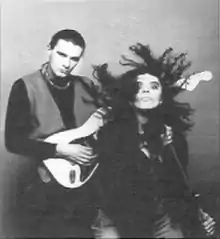Bel Tempo
Bel Tempo (Serbian Cyrillic: Бел Темпо) was a Serbian and former Yugoslav pop rock duo.
Bel Tempo | |
|---|---|
 Bel Tempo: Vlada Petričević (left) and Suzana Petričević (right) | |
| Background information | |
| Origin | Belgrade, Serbia, SFR Yugoslavia |
| Genres | Pop rock, jazz |
| Years active | 1986 – 1992 1996 |
| Labels | PGP-RTB |
| Past members | Vlada Petričević Suzana Petričević |
History
Bel Tempo was formed in 1986 in Belgrade by brother and sister Vladimir "Vlada" Petričević (guitar, keyboards, vocals) and Suzana Petričević (vocals).[1] They chose the name after Bora Ćosić's play Bel Tempo. Suzana previously graduated at the Belgrade Drama Arts Academy and became an actress in the National Theatre in Belgrade, but had also acted in Zvezdara Theatre and Atelje 212. She had her singing debut on Momčilo Bajagić's album Pozitivna geografija in the song "Papaline" ("Bristlings").[2][3] Vlada previously graduated at the Belgrade Music Academy as a pianist, but at the same time learned to play guitar.
They released their eponymous debut album in 1987 through PGP-RTB,[4] featuring pop rock sound with jazz elements. The songs were written by Vlada, while the lyrics for the song "Povedi me" ("Take me") were provided by Suzana.[5] The album also featured a cover of a Hungarian romance entitled "Zašto ne smem da te ljubim" ("Why I Can Not Kiss You").[6] The album featured Nenad Stefanović "Japanac" on bass guitar, Alekandar Ralev on keyboards, and Papa Nik on percussion.[7] It also featured brass section on some of the songs. Bel Tempo was produced by Vladimir Racković,[8] who was previously the leader of the acoustic rock band Odiseja. The album was better accepted in Zagreb than in Bel Tempo's home city of Belgrade, so the band often performed in the Zagreb club Kulušić.
After five years, in 1992, the band released their second album Modesty.[9] The album concept was inspired by the comic strip character Modesty Blaise. The authors of the songs were both Vlada and Suzana. The album featured Saša Lokner on keyboards, Aleksandar Jelić on bass guitar, Nenad Petrović on saxophone, and other musicians.[10] After the album was released Bel Tempo ended their activity.[11] Suzana continued to perform in the Belgrade jazz club Tabu. Vlada started working as a Radio Television of Serbia editor.
Bel Tempo made a brief comeback to appear on the 1996 MESAM festival with the song "Ljubomora" ("Jealousy").[12] After this appearance Vlada retired from music, appearing only as an author of the songs "Budi mi drug" ("Be My Friend") and "Jedna pesma koju volim" ("A Song that I Love") released on Marina Perazić's 1998 album Ista kao more (The Same as the Sea).[13]
Discography
Studio albums
- Bel Tempo (1987)
- Modesty (1992)
Singles
- "Ljubomora" (1996)
External links
References
- "Bel Tempo biography, www.balkanuk.com". Archived from the original on 2009-09-13. Retrieved 2010-08-25.
- "Bel Tempo biography, www.balkanuk.com". Archived from the original on 2009-09-13. Retrieved 2010-08-25.
- Pozitivna geografija at Discogs
- "Bel Tempo biography, www.balkanuk.com". Archived from the original on 2009-09-13. Retrieved 2010-08-25.
- "Bel Tempo biography, www.balkanuk.com". Archived from the original on 2009-09-13. Retrieved 2010-08-25.
- "Bel Tempo biography, www.balkanuk.com". Archived from the original on 2009-09-13. Retrieved 2010-08-25.
- "Bel Tempo biography, www.balkanuk.com". Archived from the original on 2009-09-13. Retrieved 2010-08-25.
- "Bel Tempo biography, www.balkanuk.com". Archived from the original on 2009-09-13. Retrieved 2010-08-25.
- "Bel Tempo biography, www.balkanuk.com". Archived from the original on 2009-09-13. Retrieved 2010-08-25.
- "Bel Tempo biography, www.balkanuk.com". Archived from the original on 2009-09-13. Retrieved 2010-08-25.
- "Bel Tempo biography, www.balkanuk.com". Archived from the original on 2009-09-13. Retrieved 2010-08-25.
- "Bel Tempo biography, www.balkanuk.com". Archived from the original on 2009-09-13. Retrieved 2010-08-25.
- Ista kao more at Discogs
- EX YU ROCK enciklopedija 1960-2006, Janjatović Petar; ISBN 978-86-905317-1-4